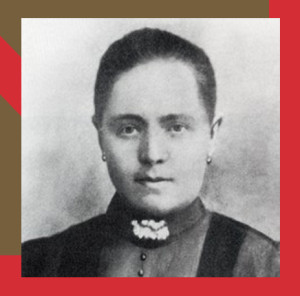Maria Plozner Mentil (1884-1916) served in the Italian armed forces as a Carnic bearer. The Carnic bearers were women who were active in the First World War, along the front of the Carnia (a region in Northeastern Italy) carrying heavy baskets of supplies and ammunition to the front lines of the Italian army. They were equipped with a special red armband and often had to walk to heights over 1000 metres in altitude along the slopes of the Little Pal, Pal Grande, Freikofel, Top Avostanis and Step Pramosio arrying baskets that weight 30-40 kilograms.
As well as being a Carnic bearer, Mentil also had to look after her four young children; she was left to care for them on her own when her husband Guiseppe Mentil was sent to fight in the Karst. Living in the Italian village of Timau with her children, Mentil eventually found herself amongst the soldiers as the mountains around her home were turned into battlefields. Carnia was a strategically important area because if the Austrian army would have broken through it, the Austrians would have had access to one of the “main doors” to Italy. The mountains were manned by 10-12,000 Italian soldiers who needed supplies, ammunition, medicines and various tools from the bottom of the valley. To address this need, General Lequio recruited women in the area to transport supplies to the front lines in the mountains. In spite of the difficult situation that she was in, Mentil was one of the thousand women who answered the call of the Italian army between August 1915 and October 1917 to transport these supplies. Aged between fifteen and sixty years old, Carnic bearers had to be ready to be called upon any time of the day or night.
On the morning of February 15th 1916 Mentil, accompanied by her friend and fellow Carnic bearer Rosalia Primus Bellina, climbed three hundred metres. Once they had emptied their baskets, they decided to linger for a bit for a rest and a bite to eat. It was at this point that Mentil was hit by a sniper and wounded in her right side. She was rescued, where she was refreshed with a little cognac and a latte, placed on a stretcher and transported down the mountain to the hospital at Paluzza, where her wound under her right shoulder was bandaged. Despite her treatment, she died in hospital that night due to the severity of her injuries.
Mentil immediately became a symbol of courage and self-sacrifice in Italy and her funeral was celebrated with military honours. She became an example to other Italian women during the First World War for her contribution and sacrifice to the war effort. In 1934, her coffin was transferred to the military cemetery at Timau, and three years later she was buried inside the Ossuary. Over time the work of the Carnic bearers in the First World War was gradually forgotten. However, Mentil’s story, and consequently the contribution of the Carnic bearers, became famous again which in 1997 the Italian President Oscar Luigi Scalfaro posthumously awarded her the Gold Medal for Valour. Now, if you visit the museum, The Carnic Zone during the Great War 1915-1918, amongst the midst of hundreds of war relics you can find a section dedicated to the history of the Carnic bearers and a memorial to Maria Plozner Mentil.


Mein grossvater hieß Josef mentil und stammte aus Timau. Ist das vielleicht ein Sohn von Maria.
Ich mache gerade Ahnenforschung meiner Familie